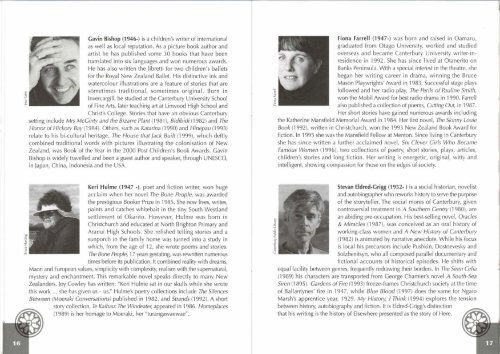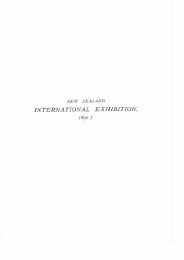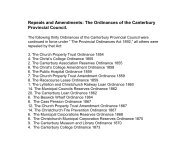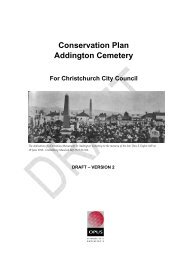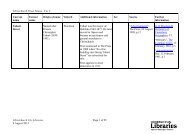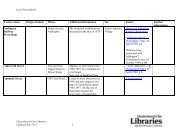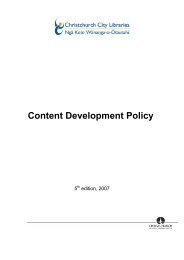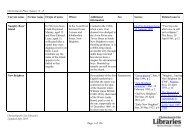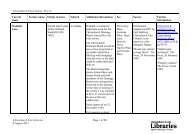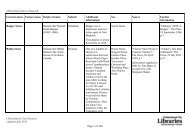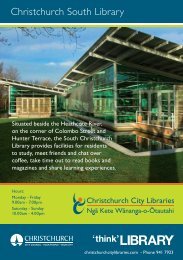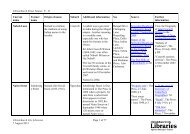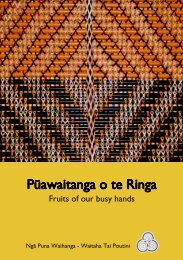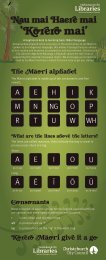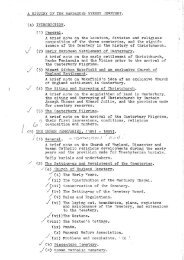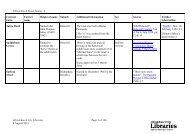Christchurch Writers' Trail PDF - Christchurch City Libraries
Christchurch Writers' Trail PDF - Christchurch City Libraries
Christchurch Writers' Trail PDF - Christchurch City Libraries
You also want an ePaper? Increase the reach of your titles
YUMPU automatically turns print PDFs into web optimized ePapers that Google loves.
Ngaio Marsh (1895-1982), acclaimed internationally as a<br />
detective story writer, was in <strong>Christchurch</strong> best known for<br />
her brilliant Shakespeare productions for the Canterbury<br />
University Drama Society. Educated at St Margaret's College<br />
and the Canterbury College School of Arts, a career as an<br />
artist or actress seemed likely. Instead she devoted her<br />
energies to becoming a writer of crime fiction and in the<br />
e 1930s was rated alongside such "Queens of Crime" as<br />
Agatha Christie and Dorothy L. Sayers. She published 32<br />
novels in London, Boston and New York and Newsweek<br />
defined them as "the best whodunits ever written". They<br />
began with A Man Lay Dead in 1934 and finished with Light Thickens in 1982. Other<br />
notable titles included Death in Ecstasy (1 936), Surfeit of Lampreys (1 941), and Off<br />
with His Head (1 957). Died in the Wool (1 944) had a Canterbury setting. Marsh also<br />
wrote essays, plays and an autobiography, Black Beech and Honeydew (1 966).<br />
Charismatic, distinctive and domineering, she made a huge impact on young writers<br />
and aspiring actors. She was awarded an honorary LittD and made a Dame Commander.<br />
Dame Ngaio's home at 37 Valley Road, Cashmere, has become a museum.<br />
D'Arcy Cresswell (1896-1960), poet, journalist, dramatist<br />
and autobiographer, was born in <strong>Christchurch</strong>, educated<br />
at Christ's College and trained as an architect. Wounded<br />
in France in 1916 he spent much of his subsequent life in<br />
England as an itinerant poet. Generally seen as a figure of<br />
fun - erratic, conceited, woman-hating and socially<br />
unreliable - he developed a view of himself as a New<br />
Zealander called to the vocation of poetry. This induced<br />
Curnow and Brasch to name Cresswell as one of those who<br />
introduced a new sense of serious intent to New Zealand<br />
literature; even though A. R. D. Fairburn likened reading<br />
Cresswell's verse to "sitting on period furniture". Cresswell published two verse<br />
collections, Poems 192 1- 1927 (1 928) and Poems 1924- 193 1 (1 932), an<br />
autobiographical sonnet sequence, Lyttelton Harbour (1 936), and a long ballad, The<br />
Voyage of the Hurunui (1 956). Other works included pamphlets, a didactic verse<br />
play, The Forest (1 952), and two memoirs, The Poet's Progress (1 930) and Present<br />
- Without Leave (1 939). The Letters of D'Arcy Cresswell, edited by Helen<br />
Shaw, was published in 1971. In general his prose is to his<br />
poetry.<br />
$1' ' of<br />
c -<br />
Monte Holcroft (1 902-1 993), born in Rangiora, was a prose<br />
writer of refinement and elegance, a social and literary<br />
commentator, essayist, novelist, short story writer, critic<br />
and the most magisterial of Listener editors (1 949-67). Some<br />
his first work was for The Press. After early struggles as<br />
a freelance novelist, he found his true metier in his reflective<br />
L.<br />
a essays on literature, history, and philosophy. His epoch<br />
P<br />
t<br />
making The Deepening Stream won the 1940 centennial<br />
f essay competition and was followed by The Waiting Hills<br />
5 and Encircling Seas, forming an inspirational trilogy for a<br />
generation of New Zealand writers striving for a distinctive<br />
philosophy of national identity. As the Listener's most celebrated editor he fostered<br />
arts in general and New Zealand literature especially, maintaining a strongly<br />
independent and liberal tone. Some of his most memorable editorials were published<br />
in The Eye of the Lizard (1 960) and Graceless Islanders (1 970). He also wrote a<br />
memoir, Reluctant Editor (1 969) and two volumes of autobiography: The Way of a<br />
Writer (1 984) and A Sea of Words (1 986). The writer Anthony Holcroft is his son.<br />
James Courage (1905-63), much like Katherine Mansfield<br />
and Dan Davin, wrote from a declining store of memories<br />
and experience in self-imposed exile in Britain. An Amberley<br />
farmer's son, who went to Christ's College then Oxford,<br />
he published five semi-autobiographical novels and a<br />
number of stories, many of them dealing with childhood<br />
and adolescence. These reveal the Puritanism and<br />
provincialism of squattocratic Canterbury, and a genteel<br />
English way of life that began to change after World War<br />
I. But the conflicts he posed had little to do with cultural<br />
and social identity: his battlefield was the family, conflicts<br />
between the sexes, father and son, old and new, and the subjectivity of the individual.<br />
A collection of his stories is aptly titled Such Separate Creatures (1 973). Other<br />
works are One House (1 933), The Fifth Child (1 948), Desire without Consent<br />
(1 950), Fires in the Distance (1 952) and A Way of Love (1 959). The Young Have<br />
Secrets (1 954), his best-known novel, deals tellingly with his Sumner and <strong>Christchurch</strong><br />
childhood. Courage suffered bleak periods of depression resulting from<br />
his homosexuality.


